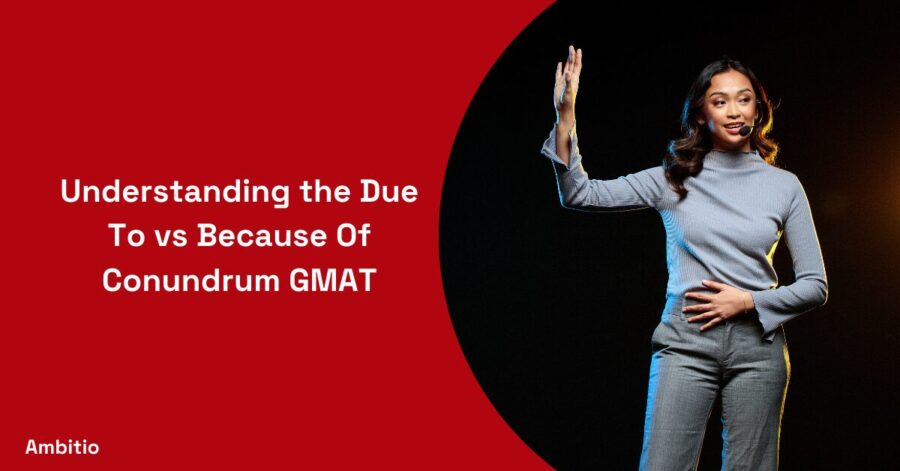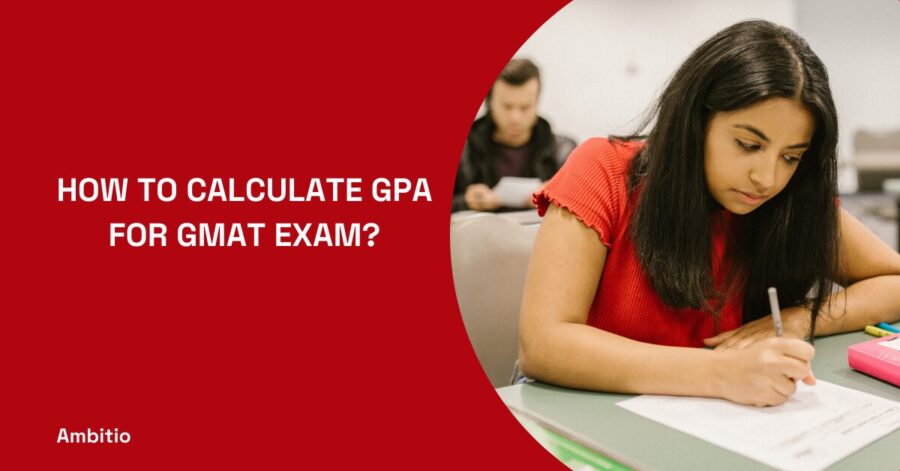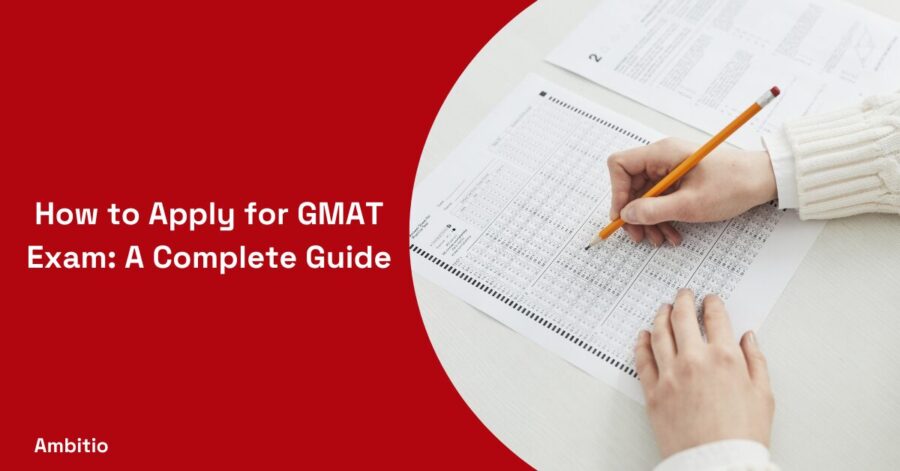17 December 2024
6 minutes read
Mastering GMAT Sentence Correction: Understanding the Due To vs Because Of Conundrum

Navigating the nuances of English grammar is pivotal for success in the GMAT, especially in the Verbal section. A common stumbling block for many is differentiating between “due to” and “because of.” This blog offers an in-depth exploration of their correct usage, a critical skill in mastering sentence correction on the GMAT.
Looking for a GMAT study plan? Check out this article for detailed info: https://ambitio.club/blog/45-day-gmat-study-plan
Unraveling the Complexities of ‘Due To’ vs ‘Because Of’ in GMAT Verbal
The GMAT Verbal section assesses your command of standard written English, focusing on sentence structure and meaning. Understanding the difference between phrases like ‘due to’ and ‘because of’ is vital for this part of the exam.
The Essential Role of ‘Due To’ and ‘Because Of’ in Sentence Correction
Understanding the correct application of ‘due to’ and ‘because of’ is crucial for sentence correction in the GMAT. These terms, while seemingly similar, serve different grammatical functions and can change the meaning of a sentence when used incorrectly.
Breaking Down the Grammar: ‘Due To’ vs ‘Because Of’
‘Due to’ is an adjective phrase that typically modifies nouns or noun phrases. It is generally used to indicate a cause or reason for a certain condition or event. For instance, the sentence, “The delay was due to bad weather,” ‘due to’ modifies the noun ‘delay’, indicating the reason for it.
On the other hand, ‘because of’ is a prepositional phrase used to modify verbs. It explains the reason for an action. For example, “She arrived late because of traffic.” Here, ‘because of’ modifies the verb ‘arrived’, explaining why the action occurred.
Understanding these differences is key to correctly answering sentence correction questions on the GMAT, where precision in language is crucial.
Practical Examples and Common Mistakes
In GMAT sentence correction, a common mistake is misusing ‘due to’ in place of ‘because of’, or vice versa. Consider the sentence: “He succeeded due to his hard work.” Here, ‘due to’ incorrectly modifies the verb ‘succeeded’. The correct version should be, “He succeeded because of his hard work.”
Conversely, “The game’s cancellation was because of rain” is incorrect, as ‘because of’ should not modify the noun ‘cancellation’. The correct form is, “The game’s cancellation was due to rain.”
The Impact of Misplaced Modifiers in GMAT Sentence Structure
Misplaced modifiers can lead to ambiguous or incorrect sentences, making it essential to place ‘due to’ and ‘because of’ correctly within a sentence.
Identifying and Correcting Misplaced Modifiers
A misplaced modifier is a word, phrase, or clause that is improperly separated from the word it modifies or describes. On the GMAT, such errors can lead to confusing sentences.
For example, “Running quickly, the finish line seemed closer.” Here, ‘Running quickly’ incorrectly modifies ‘the finish line’. Correcting misplaced modifiers involves placing the modifying phrase next to the word it is supposed to modify, like “Running quickly, she saw the finish line seemed closer.”
The Role of Modifiers in Sentence Meaning
Modifiers provide additional information about other elements in a sentence. Their correct placement is crucial for maintaining the intended meaning. For instance, “She only eats vegetables.” implies that eating is the only activity she does with vegetables, which is likely not the intended meaning. A better structure would be, “She eats only vegetables,” clarifying that her diet is exclusively vegetables.
Exploring Examples from Official GMAT Materials
Analyzing examples from official GMAT materials helps understand how ‘due to’ and ‘because of’ are tested in the exam.
Sentence Correction Questions Featuring ‘Due To’ and ‘Because Of’
Official GMAT sentence correction questions often test the understanding of ‘due to’ and ‘because of’. For example, a question might present a sentence like, “Due to his expertise, the project was completed ahead of schedule.” Here, ‘due to’ incorrectly modifies ‘the project’. The corrected sentence should be, “Because of his expertise, the project was completed ahead of schedule.”
Learning from Official GMAT Explanations
The explanations provided in official GMAT materials not only clarify the right answer but also explain why other choices are incorrect. This is particularly useful for understanding the nuances of grammatical rules related to ‘due to’ and ‘because of’.
Advanced GMAT Strategies: Beyond the Basics
For high scorers, understanding the advanced nuances of ‘due to’ and ‘because of’ can make a significant difference.
When preparing for the GMAT, particularly the verbal section, it’s crucial to move beyond basic understanding and dive into more advanced strategies. These strategies can help in tackling complex sentence correction questions more effectively.
- Contextual Understanding:
- Key Point: Develop a keen sense of the context of a sentence or passage.
- Application: Look beyond individual words or phrases and understand their role in the overall sentence structure and meaning. This holistic approach is vital in discerning subtle nuances in more complex sentences.
- Advanced Modifier Placement:
- Key Point: Master the placement of modifiers, including phrases like ‘due to’ and ‘because of’, in intricate sentence structures.
- Application: Practice identifying and correcting misplaced modifiers in long and complex sentences, ensuring that they correctly and clearly modify the intended parts of the sentence.
- Recognizing Subtleties in Meaning:
- Key Point: Be aware of how slight changes in word choice or structure can significantly alter the meaning of a sentence.
- Application: Engage with practice questions that involve subtle shifts in meaning, often seen in high-difficulty GMAT questions, to enhance your sensitivity to these changes.
- Parallelism and Comparison:
- Key Point: Develop a strong grasp of parallelism and comparison structures.
- Application: Ensure that elements in lists or comparisons maintain a consistent grammatical form. This skill is crucial for quickly identifying errors in sentence construction.
- Logical Predictions and Inferences:
- Key Point: Cultivate the ability to make logical predictions or inferences based on sentence content.
- Application: Use the context and logic of the sentence to predict what grammatical structures or words should logically follow, aiding in identifying errors or the best answer choices.
- Idiomatic Usage:
- Key Point: Familiarize yourself with idiomatic expressions common in GMAT sentence correction.
- Application: Understand that certain prepositions or phrase structures are idiomatic and need to be used in specific ways, even if they defy some general grammatical rules.
- Critical Analysis of Answer Choices:
- Key Point: Develop critical analysis skills for evaluating answer choices.
- Application: Compare all answer choices closely, understanding why each one is correct or incorrect. This involves not just identifying grammatical errors but also analyzing clarity, conciseness, and stylistic elements.
- Time Management and Strategic Guessing:
- Key Point: Learn effective time management and when to make strategic guesses.
- Application: Practice pacing to ensure you spend the right amount of time on each question and develop the skill to make educated guesses when necessary, a crucial strategy for the timed nature of the GMAT.
- Customized Review and Error Analysis:
- Key Point: Engage in personalized review sessions focusing on your specific weaknesses.
- Application: After practice sessions, analyze your errors in detail to understand patterns in your mistakes. This targeted review helps in addressing specific areas of weakness.
- Utilizing Quality Prep Materials:
- Key Point: Select and utilize high-quality GMAT preparation materials.
- Application: Invest time in working with resources that offer in-depth explanations and a variety of practice questions, including those that mimic the complexity and style of actual GMAT questions.
By incorporating these advanced strategies into your GMAT preparation, you can significantly enhance your ability to tackle the verbal section with confidence and precision.
For Online GMAT preparation, check out this article: https://ambitio.club/blog/best-gmat-online-coaching
Common Errors and How to Avoid Them
Common errors with ‘due to’ and ‘because of’ can be avoided with awareness and practice.
| Common Error | Example of Incorrect Usage | Corrected Usage | Strategy to Avoid Error |
|---|---|---|---|
| Misusing ‘due to’ to start a sentence | Due to his experience, the team won. | The team won because of his experience. | Always check if ‘due to’ is modifying a noun or noun phrase. If it’s modifying a verb, use ‘because of’. |
| Using ‘because of’ to modify nouns | The success of the project was because of his leadership. | The success of the project was due to his leadership. | Ensure that ‘because of’ is modifying a verb or verb phrase, not a noun. |
| Placing ‘due to’ or ‘because of’ far from the word they modify | He failed, which was due to not studying. | He failed due to not studying. | Place modifying phrases close to the word they modify to avoid ambiguity. |
| Confusing ‘due to’ as a cause when it is a result | Due to winning the match, he celebrated. | He celebrated because of winning the match. | Remember that ‘due to’ should indicate the result of an event, not the cause of an action. |
| Incorrectly using ‘due to’ in compound sentences | He was late, and due to traffic, missed the meeting. | He was late and missed the meeting because of traffic. | In compound sentences, use ‘due to’ to modify a noun in the second clause or use ‘because of’ to modify the verb. |
| Using ‘due to’ and ‘because of’ interchangeably | She was happy due to she received good news. | She was happy because she received good news. | Understand that ‘due to’ and ‘because of’ are not interchangeable and use them according to their grammatical roles. |
| Overusing ‘due to’ in formal writing | The project was delayed, due to it was underfunded. | The project was delayed because it was underfunded. | In formal writing, such as GMAT, ensure the correct grammatical structure is used with these phrases for clarity and precision. |
For more info on GMAT scores: https://ambitio.club/blog/average-gmat-score
Conclusion
In conclusion, mastering the differences between ‘due to’ and ‘because of’ is essential for excelling in the GMAT Verbal section. Understanding their grammatical functions and practicing their correct usage will not only improve your GMAT scores but also enhance your overall command of the English language.
FAQs
What is the main difference between ‘due to’ and ‘because of’?
‘Due to’ is used to modify nouns or noun phrases, indicating a cause or reason, while ‘because of’ modifies verbs, explaining the reason for an action.
Can I start a sentence with ‘due to’ in GMAT sentence correction?
Generally, starting a sentence with ‘due to’ is not recommended, as it often leads to grammatical errors by incorrectly modifying the verb.
How can I improve my understanding of ‘due to’ and ‘because of’ for the GMAT?
Regular practice with official GMAT materials, focusing on sentence correction, and understanding the grammatical rules can significantly improve your skills.

You can study at top universities worldwide!
Get expert tips and tricks to get into top universities with a free expert session.
Book Your Free 30-Minute Session Now! Book a call now




























